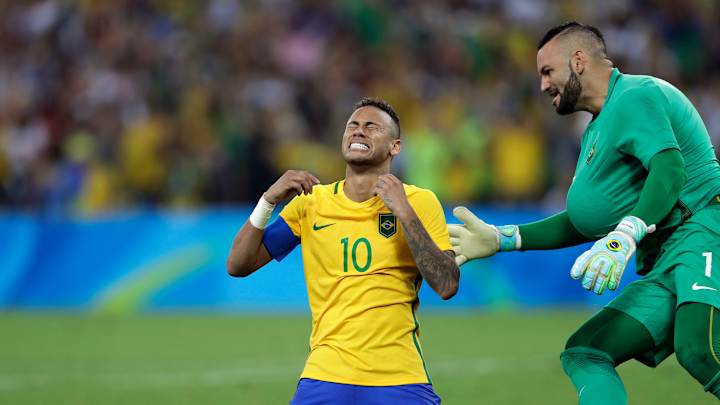Column: Brazil got its golden moment, but at what cost?

RIO DE JANEIRO (AP) Remember this moment, Brazil. Nothing feels better than winning.
Remember how it felt on that balmy Saturday night in this fabled temple of soccer, the Maracana, when the Selecao held its nerve through 120 minutes and a penalty shootout to gain some small measure of revenge against Germany.
Remember, too, how Neymar, without doubt one of the five best players in the world, won it all.
How he kissed the ball before the fifth penalty kick and how his teammate, the goalkeeper Weverton, retrieved it the moment after, then tucked it under his jersey for safekeeping, smiling widely.
''Beloved nation, the gold is ours,'' Weverton said, still holding the ball. Alongside, his teammates filled out the top step of the podium and sang the national anthem along with nearly 80,000 deliriously happy fans.
''This ball is mine, it's part of history,'' Weverton added. ''With all due respect to everybody who has a beautiful history and tried for a long time, God put this generation in this position to make history, and we did.''
Remember this moment.
Because it came at a cost.
This is a nation that needs another sewage plant more than another trophy, a nation that hasn't paid its cops and firefighters and teachers for weeks.
It cost $12 billion or so this cash-strapped land doesn't have.
It's a legacy, all right, but cold comfort considering the way the real German national team humiliated Brazil's best, 7-1, in the World Cup on home soil here just two years ago. It's bragging rights, too, at least until the 2018 World Cup rolls around and the promising kids who filled out both rosters Saturday night give way to the best players both countries can muster. The question of who's really the best will be answered soon enough.
Until then, Brazil can claim to be back on top in soccer. But everything else here is in a state of flux. The economy is teetering; the president, Dilma Rousseff, is under impeachment. The interim president, Michel Temer, is so unpopular that he's already announced plans to skip the closing ceremony Sunday night - apparently to avoid the lusty booing that greets him at nearly every public appearance.
''This restores our self-esteem,'' Brazil coach Rogerio Micale said. ''We see that not all was lost, our football is still alive. There are some things that need to be fixed, but today we were able to make our people happy. I'm very happy to be able to be a part of this.''
There is no such thing in Brazil as caring too much about soccer. The game bestows pride and national identity. It carries an importance all out of proportion to any value that can be measured.
People jumped out of windows after a historic loss to Uruguay in the 1950 World Cup inside this same stadium.
The lingering pain from that 1950 loss bequeathed the Brazilian language a new word, ''Maracanazo.'' Roughly translated, it means the ''great Maracana blow.'' It has haunted Brazilians ever since. The great Pele once told a story about listening to the game on a radio at home and recalled it was the first time he saw his father cry.
Brazil's resolve is about to be tested like few times in its history. The World Cup and the Olympics were magnificent theater, but the tourists are heading for the exit and the show is about to end. Left to look inward once more, Brazilians will find themselves facing the same daunting economic and political challenges.
Rousseff's impeachment trial begins later this month. No matter who ultimately winds up in charge, he or she can do little to reverse the sharp decline in the price of oil and the other commodities that fueled Brazil's surging economy less than a decade ago. A nation that has learned only too well the meaning of sacrifice will be asked to be patient and tighten its belt yet again.
Memories of Neymar's golden goal will sustain his countrymen for as long the game retains the most special of places in their hearts. It won't help repair the damaged infrastructure, clean up the pollution or put food on the table.
But for the moment, it will have to be enough.
---
Jim Litke is a national sports columnist for The Associated Press. Write to him at jlitke(at)ap.org and http://www.Twitter.com/JimLitke
